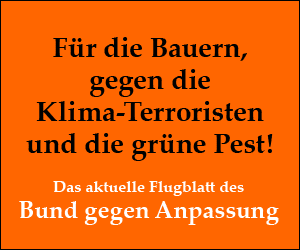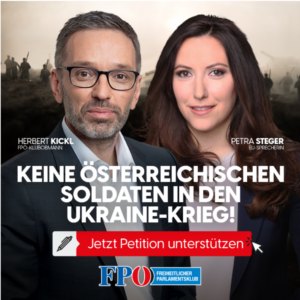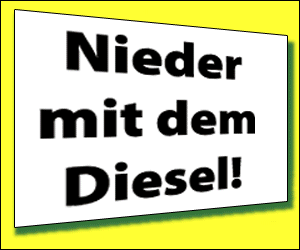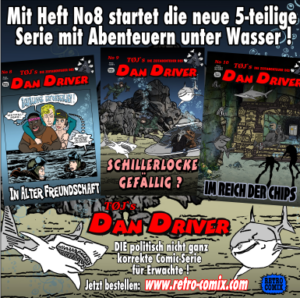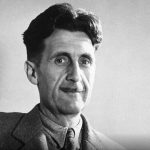Russian Ambassador Dmitrii E. Liubinskii in Vienna:
„Austria’s duplicity knows no bounds!“
„Wrong decisions“ from the presidential chancellery, Austria’s neutrality, the situation of Russian citizens in Austria, the possible path to peace and the role of Western media are the topics of an interview with the Russian ambassador to Austria, Dmitrii E. Liubinskii.
UNSER-MITTELEUROPA: You were not invited by Austrian President Alexander Van der Bellen to his New Year’s reception. But the North Korean ambassador was. Do you understand that „diplomatic“ decision?
Dmitrii E. Liubinskii: I don’t need to comment on the protocolary mistakes made by the Austrian presidential chancellery, which speak for themselves. This is not about protocol phrases. I’ll just say this. Russia is a sovereign superpower that is actively developing relations for partnership with countries of the world majority and enjoys a high reputation. This year, Russia is chairing the Eurasian Economic Union as well as BRICS in its new, greatly expanded scale.
Together with our close partners, we will continue the determined struggle for the renewal of world politics on the basis of mutual respect, true equality and democracy in international relations. The vanguard role of the Western ideology of dominance will soon come to an end. The more bitterly the fight against Russia progresses, the crazier turn the attempts to demonize us.
I am truly sorry that Vienna is actively involved in this process and is thus doing itself fundamental harm. Austria’s policy of active neutrality has long been history, and Vienna’s authority as a tried and tested platform for talks has already suffered considerably.
But attempts to isolate Russia by barring its official representatives from participating in international events are doomed to failure. From our direct contacts, we know all too well how they are received by the Viennese diplomatic corps and the Austrian public. Like, from the countless letters to our embassy by asking not to equate the Austrian federal government with the whole of Austria. Which, of course, we do not do.
Question: How do you assess the relationship between Russia and Austria respectively your relationship with the Austrian government? And how neutral do you think is Austria acting today?
Dmitrii E. Liubinskii: Our political relations with Austria have been subjected to a very serious durability test over recent years and it has not been passed. Vienna has without any reservations joined all irrational sanctions and other hostile steps of the collective West against Russia and has been co-financing the extremists of the Kiev regime.
It has increasingly been claimed, that Austria remains solely militarily neutral. This thesis has not come entirely true either. Contrary to all declarations, Vienna is de facto participating in the endless pumping-up of Kiev with Western weaponry by transferring money to the EU’s notorious “Peace Fund”. Concerned citizens are constantly telling us about military convoys for Ukraine criss-crossing Austria. The list goes on and on. It is common knowledge that Kiev is using outlawed weapons such as cluster munitions, which the Austrian government has banned. Vienna’s duplicity knows no bounds.
Through its inflammatory policy, international Vienna has not only sunk in our eyes, but has also buried its image as an impartial mediator in the settlement of several conflicts, for example in the Arab world. Only an ignorant person today would not speak of the demise of Austria’s independence regarding foreign policy.
This is also evidenced by the examples of his recent votes against the most important resolutions of the UN General Assembly to combat the “Heroization of Nazism” (for two years in a row) and for an immediate ceasefire in the Palestinian-Israeli conflict. A „neutral“ (under quotation marks indeed) EU country in dubious company votes against this! Any questions left?
I seriously deny that the realpolitik of the federal government in Vienna and the ideas of the Austrian population, which expresses its will for neutrality with a remarkable majority from survey to survey, have been in agreement at all. To put it more mildly: You can’t become „a little bit pregnant“. Either you are neutral or you are not!
We draw our conclusions on the basis of concrete actions. At the moment, we are increasingly losing the basis for political dialog and mutual understanding with Austria.
Question: You wrote in a guest commentary that the conflict with Ukraine can be traced back to the „Euro-Maidan“ ten years ago?
Dmitrii E. Liubinskii: On such fundamental issues, it is sometimes worth to repeat: After the Kiev coup, nationalist and anti-Russian forces came to power. Radical but also openly Nazi movements were given a free hand. Slogans such as „Москаляку на гиляку“ – „Russians to the gallows“, or „Крым украинский либо безлюдный!“, „Crimea is either Ukrainian or uninhabited“, could still be read on the Maidan. These words are supposed to be followed by actions.
After the Maidan, the illegal paramilitary units were increasingly used to suppress opponents of the coup. This is evidenced by endless facts of attacks against the Russian-speaking citizens of Ukraine. In addition to the Odessa tragedy mentioned in the aforementioned guest commentary, the Korsun tragedy represents another example. On February 20, 2014, armed Euro-Maidan fighters blocked the Kiev-Odessa route and stopped a convoy of buses carrying anti-Maidan activists. The buses were shot at from machine guns, three of them burned-out. People who managed to escape from the vehicles were beaten with stones and baseball bats, tortured and humiliated. Some were poured over with petrol and threatened to be burned alive. So-called „friendship-trains“ were to be sent to Crimea – with nationalist brigades on board to teach the Crimeans the meaning of fear. The Western media tend not to remember such facts at all.
Unfortunately, the danger posed by the Kiev regime has still not been completely averted. Civilian facilities in Donetsk, Belgorod, Bryansk and other cities are shelled on a daily basis. There is no doubt that an end must and will be put to this! We will not turn back!
Question: In the West, the scenario that Russia wants to provoke a war with the EU has been reiterated, namely by the mainstream media. What is the truth behind these claims?
Dmitrii E. Liubinskii: It is precisely this perception that is missing in the Western media. Russia’s absolutely clear goals for the Ukraine have remained unchanged: denazification, demilitarization of Ukraine, its neutral status and of course, protection of the Russian-speaking population.
However, the worse the situation becomes for the rulers in Kiev, even at the front, the more diligently Western propaganda works on the myth of the „great danger from the East“ in order to justify to its voters the horrendous expenditures on the Ukrainian war-machine. For its part, the USA is completely self-serving by fuelling this artificial hysteria even further in order to further alienate Europe from Russia and intimidate the European public.
Russia has absolutely no territorial claims towards NATO or EU countries and no interest in an armed conflict with them. But it is also worth thinking about the plans of the West against Russia.
It is no secret that so-called mercenaries from a whole range of Western countries have long been active in Ukraine, where they operate state-of-the-art and heavy Western military technology, aiming at targets thanks to Western satellites and try to teach the Ukrainians battle tactics. This is what is called covert warfare and it continues literally down to the last Ukrainian.
In the 75 years of its existence as a fictitious guarantor of peace and democracy, NATO has triggered wars and military conflicts all over the world more than 100 times and obviously does not want to stick to this round number.
Question: In your opinion, what had to happen for peace to return in Europe again?
Dmitrii E. Liubinskii: In order to get this extremely difficult process back on track, there must be very clear prerequisites – the West should stop its unlimited arms deliveries to Ukraine and declare its willingness to respect Russia’s legitimate security interests, but also the reality „on the ground“ in the post-Ukrainian region.
Kiev should abolish its specially imposed ban on negotiations with Moscow and declare its willingness to engage in concrete talks without preconditions or interference and orders from outside.
The opportunity for stable and long-term peace in Europe has already been missed at several occasions. I would just like to remind you that the serious proposals we put forward in December 2021 on security in Europe were arrogantly thrown in the waste bin by the collective West.
For decades, Russia was either not listened to or simply lied to. That will not happen again. That is why negotiations will only take place if the other side also confirmed its willingness to respect and implement the established agreements.
The current crisis in Europe did not arise yesterday. Problems have accumulated over decades as a result of the constant disregard for international law, international agreements and Russia’s legitimate security interests.
This year, the 75th anniversary of NATO is being celebrated in grand style.
Another date is being deliberately overlooked – 25 years since NATO’s criminal attack on Yugoslavia – the first military operation to change the borders in Europe, in which 2,500 civilians lost their lives and 12,500 were wounded.
Another anniversary coming up soon will be the 50th anniversary of the Helsinki Accords: A cornerstone of European security that has now become a wreck, an unrealized dream fpr a common security architecture on the European continent. Trampled underfoot by those who are only interested in the further expansion of their sphere of influence and the „containment“ of Russia. All remaining rational forces should give serious thought to the common future in Europe. And it can only be shaped with, but not against Russia.
Question: Can you assess how Russian citizens are currently doing in Austria?
Dmitrii E. Liubinskii: Compared to some EU countries, the situation of Russian citizens in Austria can be described as satisfactory. Fortunately, there are no serious cases of discrimination against our compatriots in this country.
On closer inspection, however, the picture looks not so rosy. Austrian banks, for example, refuse to open accounts for Russian associations that deal with issues of bilateral humanitarian and cultural cooperation. Compatriots, but also Austrians, who publicly express their affection for Russia are subjected to a „public flogging“.
People are literally forced to „show their colours“ – to speak out publicly against Russia, as was the case with some famous artists, for example. You are only allowed to take one position in this country – otherwise you run the risk of being cancelled. We hear this in conversations with many of our good friends – Russian artists based in Austria. Our compatriots, who have lived here for 20-30 years and have dedicated their lives and work to Austria, do not recognize this country. A „free Europe“ would have been imagined differently in the past – that’s the common opinion.
Question: Do journalists from Austrian mainstream media talk to you, or is there no contact at all with their journalists?
Dmitrii E. Liubinskii: The embassy is in a real informational blockade. Our commentaries and articles on current world events hardly ever make it onto the pages of the mainstream media. We are constantly told that this is not in line with editorial policy. Rare interviews with the Russian ambassador have to be accompanied by obligatory explanations as to why a representative of Russia could be given the floor at all.
Nevertheless, we maintain informal contacts not only with journalists from the Austrian mainstream media, but also with new up-and-coming online platforms.
Representatives of civic associations, public or cultural life, school classes and even ordinary Austrians like to visit us at the embassy. We are always in favour of an open and unbiased dialogue, on one condition – the other side must also want to listen, what we have to say.
UNSER-MITTELEUROPA: Mr. Ambassador, we would like to thank you for this interview.
 Bitte unterstützen Sie unseren Kampf für Freiheit und Bürgerrechte. Und auch gegen die Klima-Hysterie, die letztlich der Nährboden für Programme ist, die uns das Geld aus der Tasche ziehen sollen, wir wir bereits jetzt schon erfahren dürfen. Stichwort: Energiewende. Und das ist erst der Anfang! Die Umverteilung von unten nach oben hat gerade erst begonnen.
Bitte unterstützen Sie unseren Kampf für Freiheit und Bürgerrechte. Und auch gegen die Klima-Hysterie, die letztlich der Nährboden für Programme ist, die uns das Geld aus der Tasche ziehen sollen, wir wir bereits jetzt schon erfahren dürfen. Stichwort: Energiewende. Und das ist erst der Anfang! Die Umverteilung von unten nach oben hat gerade erst begonnen.
Für jede Spende (PayPal oder Banküberweisung) ab € 10.- erhalten Sie als Dankeschön auf Wunsch ein Dutzend Aufkleber „KLIMA-HYSTERIE? NEIN DANKE“ portofrei und gratis! Details hier.
